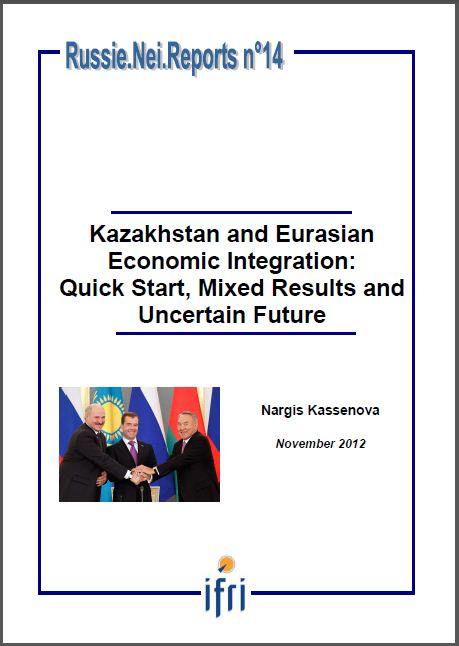Kazakhstan and Eurasian Economic Integration: Quick Start, Mixed Results and Uncertain Future

Kazakhstan's economic integration with Russia and Belarus has been advancing at break-neck speed.
In October 2007, these countries signed a treaty on the creation of the Customs Union (CU), in July 2010 the unified Customs Code went into effect, and in July 2011 customs controls were removed from the borders between member-states. In January 2012, Moscow, Astana and Minsk introduced the Single Economic Space (SES) based on “freedoms” of movement of goods, services, capital and labor to be implemented by 2015. While a union with Russia has been always an official priority, other trade integration alternatives have been pursued by the Kazakhstani government as well. The one that was in strong competition with the CU option was the prospect of joining the WTO and this way advancing Kazakhstan's integration with global markets and making the country's economy more competitive. The analysis of the possible motives (economic, political and geopolitical) explaining why Kazakhstani leadership privileged integration with Russia over joining the WTO shows that economic reasons emphasized in the official discourse did not play the main role. Political reasons (primarily, the concern with security) seem to have been more prominent.

Available in:
Regions and themes
ISBN / ISSN
Share
Download the full analysis
This page contains only a summary of our work. If you would like to have access to all the information from our research on the subject, you can download the full version in PDF format.
Kazakhstan and Eurasian Economic Integration: Quick Start, Mixed Results and Uncertain Future
Related centers and programs
Discover our other research centers and programsFind out more
Discover all our analysesThe Caspian Sea as an Emerging Energy Hub : Potentials and Limitations
This report analyzes the prospects of the Caspian Sea region — and its key actors except for Russia and Iran — becoming an important energy hub serving the needs of the European Union (EU).
The European Union's Strategic Test in Georgia
The political crisis brewing in Georgia is of an existential nature for the country. What is at stake is Georgia's future as a democratic and sovereign European nation (EU).
Commanders of Putin's Long War: Purged, Reshuffled and Disgruntled
The trend of reshuffling the Russian top military command in the course of a fast-evolving and far from successful war has progressed unevenly both across the Armed Forces’ structures and in time. The rationale for and timing of the abrupt cadre decisions made by Commander-in-Chief Putin often defy logical explanation, and the rare official clarifications are no more informative than the usual information blackout.
Russian Military Manpower After Two and a Half Years of War in Ukraine
In addition to a military victory in Ukraine, the Russian leadership is planning to build up sizable troop formations for a possible conflict with NATO in the Baltic region and the Kola Peninsula. In particular, current plans aim for the military manpower to grow by about 350,000, reaching a total of 1.5 million soldiers and commanders. In the context of the current conflict in Ukraine, this cannot be accomplished without a new wave of mass mobilization.








